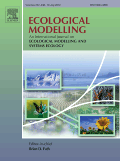
ECOLOGICAL MODELLING
Scope & Guideline
Enhancing understanding of ecological processes for a sustainable future.
Introduction
Aims and Scopes
- Mathematical and Computational Modeling:
The journal emphasizes the use of mathematical and computational models to simulate ecological dynamics, interactions, and processes. This includes various modeling techniques such as agent-based models, spatially explicit models, and system dynamics. - Ecosystem and Population Dynamics:
Research articles often focus on modeling ecosystem interactions and population dynamics, exploring factors that influence species abundance, distribution, and community structure. - Environmental Impact Assessment:
Contributions frequently address the impacts of environmental changes (e.g., climate change, land use) on ecological systems, using models to predict future scenarios and assess the sustainability of ecosystems. - Interdisciplinary Approaches:
The journal promotes interdisciplinary research that integrates ecological modeling with economic, social, and environmental sciences, thus enhancing the relevance of models for real-world applications. - Biodiversity and Conservation:
Research related to biodiversity modeling, conservation strategies, and ecosystem services is a core focus, aiming to inform policy and management decisions for sustainable resource use.
Trending and Emerging
- Agent-based and Individual-based Models:
There is a growing trend in the use of agent-based and individual-based models that simulate interactions among individual organisms, enhancing understanding of population dynamics and ecological interactions. - Climate Change Impact Modeling:
Research focusing on the impacts of climate change on ecosystems and species has increased, with models being developed to predict shifts in species distributions and ecosystem functions under changing climatic conditions. - Ecosystem Services Valuation:
A rising interest in modeling ecosystem services and their valuation reflects the need for integrating ecological models with economic assessments to inform sustainable management practices. - Machine Learning and AI in Modeling:
The incorporation of machine learning techniques and artificial intelligence into ecological modeling is on the rise, providing new tools for data analysis and model improvement. - Multi-Scale and Multi-Dimensional Approaches:
Emerging research is increasingly adopting multi-scale and multi-dimensional modeling approaches to account for complex ecological processes and interactions across different spatial and temporal scales.
Declining or Waning
- Traditional Statistical Models:
There has been a noticeable decrease in the publication of papers solely focused on traditional statistical models for ecological data analysis, as researchers increasingly favor more complex and dynamic modeling approaches. - Deterministic Models:
Research focusing exclusively on deterministic models is waning, with a shift towards stochastic and probabilistic models that better capture the uncertainties inherent in ecological systems. - Historical Data Analysis:
There is a declining interest in studies that primarily analyze historical ecological data without integrating modeling components, as the trend moves towards predictive modeling and scenario analysis. - Single-species Focus:
Studies that concentrate on single-species modeling are becoming less common, as there is a growing emphasis on multi-species interactions and ecosystem-level modeling. - Linear Regression Models:
The use of simple linear regression models in ecological research is decreasing, as more researchers are exploring nonlinear and complex relationships through advanced modeling techniques.
Similar Journals

Ecological Complexity
Advancing insights into ecological intricacies.Ecological Complexity is a prestigious academic journal published by Elsevier, dedicated to advancing the understanding of complex ecological systems through innovative modeling and analysis. With an ISSN of 1476-945X and an E-ISSN of 1476-9840, this journal has been a critical platform for researchers since its inception in 2004, with a forecasted operation until 2024. The journal enjoys an esteemed Q2 ranking in both the Ecological Modeling and Ecology, Evolution, Behavior and Systematics categories as of 2023, highlighting its significant impact and relevance in the field. Additionally, it ranks impressively in Scopus, with 85th out of 721 in the Ecology category and 11th out of 41 in Ecological Modeling, illustrating its commitment to high-quality research dissemination. While it does not currently offer Open Access options, Ecological Complexity remains a vital resource for ecologists, environmental scientists, and interdisciplinary researchers aiming to deepen their understanding of ecological interactions and systems. The journal is based in the Netherlands at RADARWEG 29, 1043 NX, AMSTERDAM, and serves as an essential forum for fostering innovative research that bridges theoretical concepts and practical applications in ecology.
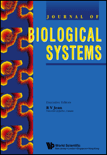
JOURNAL OF BIOLOGICAL SYSTEMS
Connecting theory and practice in biological research.Journal of Biological Systems is a prestigious journal published by World Scientific Publishing Co. Pte Ltd that serves as a vital platform for interdisciplinary research in the domains of agricultural and biological sciences, applied mathematics, and ecology. With its inception in 1996 and converging insightful contributions up to the present, the journal showcases innovative research that influences both theoretical and practical aspects within these critical fields. Its commendable Q2 category rankings in 2023 highlight its commitment to high-quality scholarship, achieving rankings of #62 in Agricultural and Biological Sciences, #243 in Applied Mathematics, and #204 in Ecology on the respected Scopus index. While the journal maintains a traditional publishing model, its rigorous peer-review process ensures that it meets the highest academic standards. The Journal of Biological Systems is essential reading for researchers, professionals, and students keen to keep abreast of the latest developments and methodologies impacting ecological systems, mathematical applications, and biological innovations.

Annual Review of Ecology Evolution and Systematics
Advancing the Frontiers of Ecological and Evolutionary ScienceThe Annual Review of Ecology, Evolution, and Systematics, published by Annual Reviews, is a leading academic journal dedicated to advancing the understanding of ecological and evolutionary processes. With a commendable impact factor and impressive rankings—9th in both the Ecology, Evolution, Behavior and Systematics category and the Environmental Science category—this journal is recognized for its rigorous peer-reviewed articles that synthesize research findings across a wide range of topics within the fields of ecology and evolutionary biology. Established in 2003, this annual publication aims to provide researchers, professionals, and students with comprehensive insights into the latest developments and trends within these dynamic disciplines. By facilitating access to high-quality scholarly articles, the Annual Review of Ecology, Evolution, and Systematics continues to play a crucial role in fostering scientific discourse and discovery.

Nature Conservation Research
Driving impactful research for ecological resilience.Nature Conservation Research is a prominent open-access journal that has been dedicated to advancing the field of conservation science since its inception in 2016. Published by the SARANSK FOND PODDERZKI & RAZVITIA ZAPOVEDNYH in the Russian Federation, this journal serves as a vital platform for researchers, professionals, and students alike, providing critical insights into ecological and environmental issues. With an impressive impact factor and ranked in the second quartile across multiple categories—including Agricultural and Biological Sciences, Earth and Planetary Sciences, Ecology, and Nature and Landscape Conservation—Nature Conservation Research stands at the forefront of impactful scientific discourse. The journal not only aims to disseminate high-quality research findings but also seeks to foster collaboration and innovation in conservation practices globally. By ensuring open access to its content, it promotes widespread dissemination of knowledge, crucial in the fight against biodiversity loss and environmental degradation. Researchers and practitioners contributing to the journal will find themselves at the convergence of science and conservation efforts, paving the way for sustainable ecosystem management.
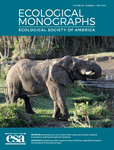
ECOLOGICAL MONOGRAPHS
Bridging theory and practice in the realm of ecological science.ECOLOGICAL MONOGRAPHS, published by WILEY, stands as a premier journal in the field of ecology, evolution, behavior, and systematics, with an impressive impact factor and ranking in the 96th percentile among its peers. Since its inception in 1974, this journal has offered comprehensive insights and advanced knowledge on ecological phenomena, serving as a vital resource for researchers, professionals, and students alike. With its commitment to publishing high-quality, peer-reviewed articles, it operates within the esteemed Q1 category of ecology, solidifying its reputation as a leading platform for innovative research. Though not available as open access, ECOLOGICAL MONOGRAPHS ensures broad reach and visibility through its rigorous editorial standards and substantial scholarly contributions. As it continues to aggregate vital ecological data and synthesize research across multiple converged years, this journal remains invaluable for those dedicated to understanding complex ecological interactions and their implications for environmental policy and management.

Methods in Ecology and Evolution
Advancing ecological insights through innovative methodologies.Methods in Ecology and Evolution, published by WILEY, is a leading journal in the fields of ecology, evolution, and environmental science, with an impact factor that reflects its high-quality research contributions. Since its inception in 2011, this journal has become a cornerstone for researchers and practitioners, offering a platform for innovative methodologies and transformative insights that advance our understanding of ecological and evolutionary processes. With a prestigious Q1 ranking in both Ecological Modeling and Ecology, Evolution, Behavior and Systematics, the journal stands out among its peers, being ranked #28 out of 721 in the Agricultural and Biological Sciences category and #4 out of 41 in Environmental Science. The journal's comprehensive scope encourages interdisciplinary collaboration, making it an essential resource for anyone working at the intersection of ecological research and data modeling. Although it does not offer open access, the wealth of knowledge within its pages is invaluable for developing effective conservation strategies and understanding complex biological systems.
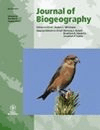
JOURNAL OF BIOGEOGRAPHY
Charting New Territories in Biogeography and EcologyJOURNAL OF BIOGEOGRAPHY, published by Wiley, stands as a premier multidisciplinary platform for the publication of high-quality research in the fields of biogeography and ecology. With an impressive Q1 ranking in both Ecology and Ecology, Evolution, Behavior and Systematics categories for 2023, this journal is recognized for its significant contribution to understanding ecological patterns and processes across geographic spaces. The journal, which has been in circulation since 1948 with a continuous production from 1979 to 2024, features rigorously peer-reviewed articles, critical reviews, and essential data that illuminate the dynamic interactions between organisms and their environments. While this journal does not currently offer open access options, it remains a valuable resource for researchers, professionals, and students seeking to explore the latest discoveries and theoretical advances in biogeography. With impressive Scopus rankings, including a 73rd position out of 721 in Agricultural and Biological Sciences and a 53rd position out of 461 in Environmental Science, the JOURNAL OF BIOGEOGRAPHY is indispensable for those aiming to advance their understanding of ecological frameworks and biodiversity conservation.

Ecological Processes
Innovating ecological research for global sustainability.Ecological Processes, published by Springer, is a premier open-access journal dedicated to advancing the understanding of ecological modeling and ecological processes. With a significant impact factor evidenced by its prestigious Q1 ranking in both Ecological Modeling and Ecology categories, as well as impressive Scopus rankings—41st out of 461 in Environmental Science and 7th out of 41 in Ecological Modeling—this journal is a vital resource for researchers, professionals, and students alike. Established in 2012 and operating under an open-access framework since its inception, Ecological Processes strives to provide a platform for high-quality research that addresses critical ecological challenges, ensuring wide dissemination of its articles to a global audience. The journal's focus encompasses various aspects of ecological modeling as well as practical implications for managing natural resources, making it an essential publication for anyone interested in the dynamics of ecological systems and their implications for sustainability.
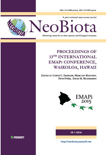
NeoBiota
Championing innovative research in ecology and conservation.NeoBiota, published by Pensoft Publishers in Bulgaria, is a preeminent Open Access journal dedicated to advancing knowledge in biodiversity, ecology, and conservation science. Since its inception in 2011, it has established itself as a pivotal platform for scholarly discourse, maintaining an impressive impact factor that places it in the Q1 quartile across multiple categories, including Animal Science and Zoology, Aquatic Science, and Ecology. With its articles indexed in leading databases and Scopus rankings that affirm its standing (e.g., rank #12 in Animal Science and Zoology), NeoBiota serves as a vital resource for researchers, professionals, and students. The journal emphasizes the synthesis of ecological modeling and evolutionary processes, fostering interdisciplinary collaboration and promoting rigorous research methodologies. Authors are encouraged to contribute their insights on biodiversity metrics, ecosystem dynamics, and the ecological implications of anthropogenic changes, making NeoBiota essential for anyone invested in the future of our planet's ecosystems. Discover the treasures of ecological scholarship through this influential journal.

Ecological Indicators
Shaping the future of ecology with cutting-edge findings.Ecological Indicators, published by Elsevier, is a prestigious journal dedicated to advancing the fields of ecology and environmental science. With an impressive impact factor and ranked in the Q1 quartile for both Ecology and Decision Sciences categories, the journal serves as a vital resource for researchers and professionals aiming to apply ecological knowledge to real-world problems. The journal covers a broad scope of topics within ecological indicators, aiming to provide comprehensive insights into biodiversity, ecosystem health, and sustainability metrics. Founded in 2001 and continuing through 2024, Ecological Indicators has established itself as a leader in disseminating significant research and innovative findings. The journal's standing is reflected in its remarkable Scopus ranks, placing it among the top percentile in its respective categories. Authors are encouraged to submit their work to share vital findings with an engaged audience of researchers, professionals, and dedicated students, ensuring the continued relevance and impact of ecological research on global environmental policies and practices.